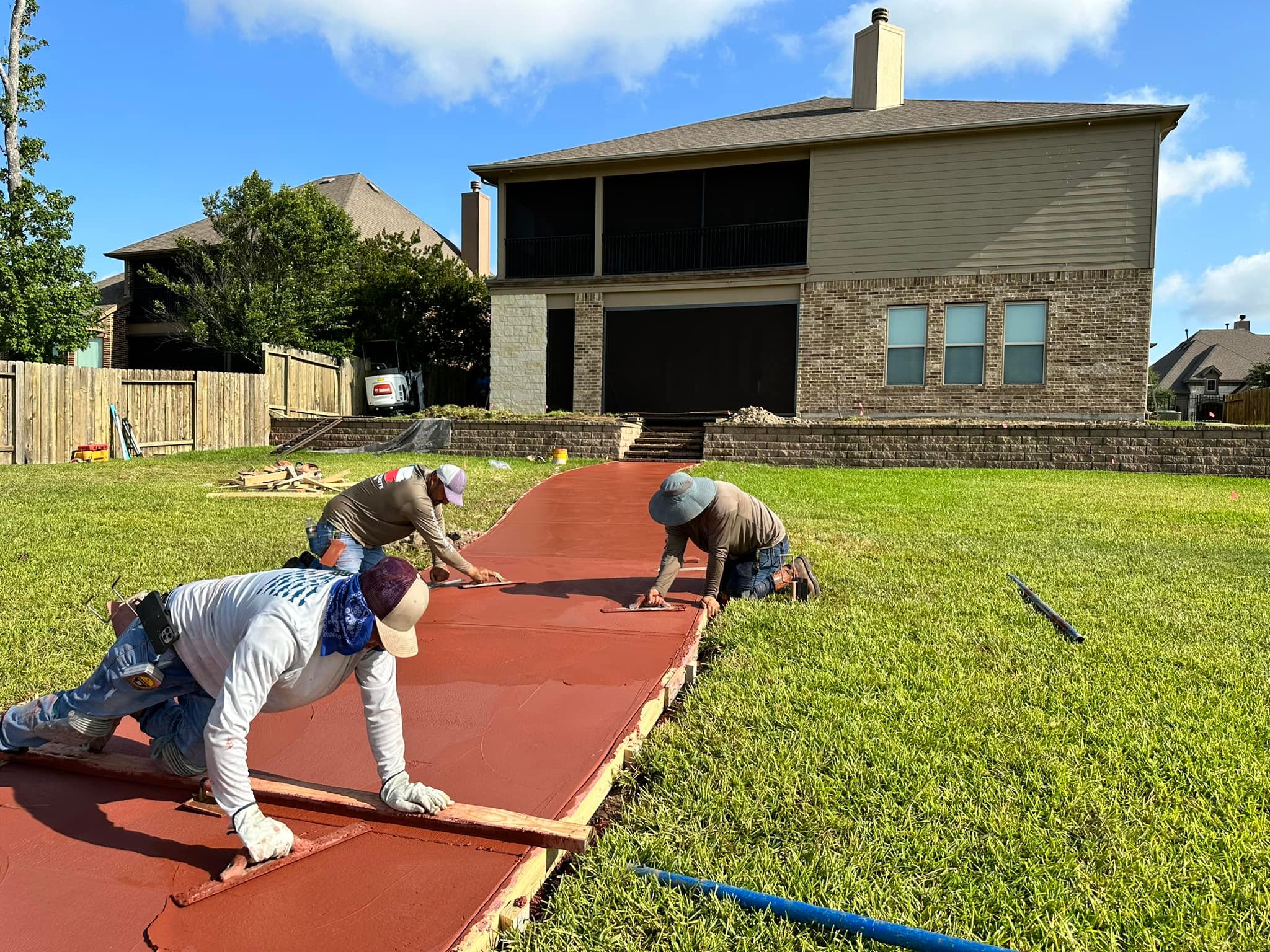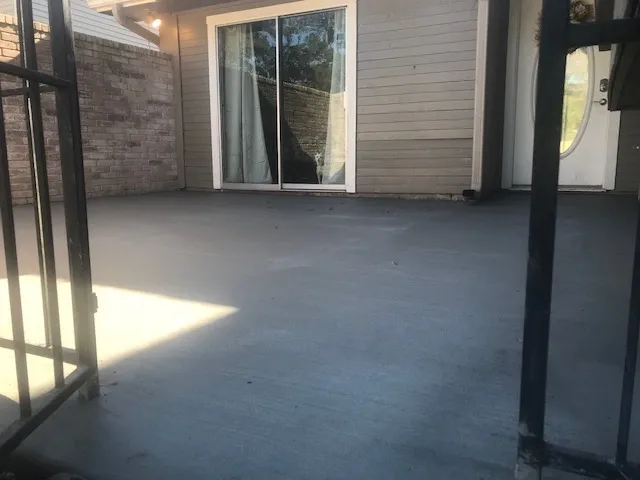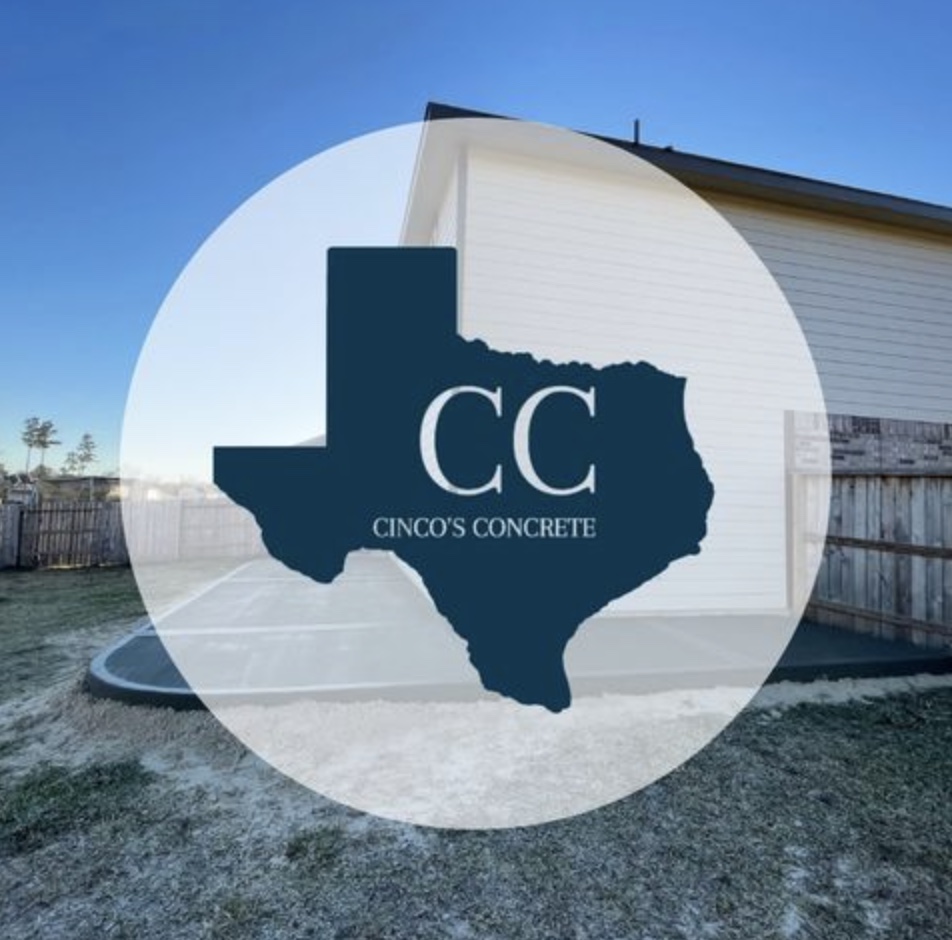
How much do contractors charge to pour concrete?
How Much Does it Really Cost to Pour Concrete? A Contractor's Guide to Pricing Your Project in Houston
As a homeowner, you've likely considered adding a new concrete surface or replacing an old one. Maybe it's a new driveway, a spacious patio for entertaining, or a sturdy foundation for a shed. Concrete is incredibly versatile and durable, serving as the backbone for many essential outdoor features.
But when it comes to getting it poured, one of the first and most pressing questions you'll ask is: "How much is this going to cost?" It’s a fair question, and the answer, unfortunately, isn't always a simple, single number.
The cost to pour concrete can vary widely depending on many factors that go beyond just the material itself. On average, you can expect a concrete slab to cost somewhere between $6 to $12 per square foot installed.
To put that into perspective, if you're looking to pour a common size like a 30'x30' slab, the total cost could range from $5,400 to $10,800. While the concrete materials themselves might cost roughly $3 to $7 per square foot, that's just one piece of a much larger puzzle.
Here at Cincos Concrete, serving Houston, Humble, Spring, Atascocita, and the surrounding Texas areas for over 20 years, we believe in transparency. We understand that knowing what you're paying for is just as important as knowing the final price.
In this comprehensive guide, we'll break down the true costs involved in pouring concrete. We will explain in detail what influences these prices, and show you why investing in professional quality with an experienced contractor pays off significantly in the long run.
The Foundation of the Price: What Goes into Concrete Cost?
When a reputable contractor provides you with a quote for a concrete project, they're factoring in much more than just the raw materials. Think of it like baking a complex cake – you need high-quality ingredients, specialized tools, and most importantly, a skilled baker.
This baker knows exactly how to put it all together to create a masterpiece.
1. Material Costs: Beyond Just the Concrete Itself
Yes, the concrete mix itself is a primary and significant material cost. As a general guide, the concrete materials typically cost $3 to $7 per square foot.
This mix is usually ready-made concrete, carefully formulated for specific strengths. It is delivered to your site by a specialized mixer truck. The price here can fluctuate based on several factors.
Concrete Mix Design (PSI): Concrete strength is measured in PSI (pounds per square inch). A standard sidewalk or light-duty patio might be perfectly fine with a 3000 PSI mix.
However, a heavy-duty driveway, an RV pad, or a structural foundation will require a stronger mix, often 4000 PSI or even higher. Stronger mixes contain more cement and specialized additives, which naturally increases their cost.

Ready-Mix Delivery Fees: Ready-mix concrete companies charge for the delivery of the concrete, and these fees can sometimes be substantial. They often have minimum order sizes, for example, 2 or 3 cubic yards.
If your project is very small and doesn't meet the minimum, the delivery fee per cubic yard (or per square foot) can go up significantly. The distance from the concrete plant to your project site in Houston also plays a role in delivery charges.
Reinforcement Materials: Concrete is incredibly strong under compression (when squeezed) but relatively weaker under tension (when pulled or stretched). To prevent cracking due to temperature changes, settling, or heavy loads, reinforcement is almost always necessary.
Wire Mesh: This is a grid of steel wires, commonly used for patios, sidewalks, and shed slabs. It's generally the more affordable reinforcement option.
Rebar (Reinforcing Bar): These are sturdy steel rods, crucial for heavier loads like driveways, structural foundations, or any concrete that needs to withstand significant weight or movement. Rebar is more expensive than mesh and also requires more labor to cut, bend, and install into a precise grid.
Sub-Base Materials: What goes underneath the concrete is just as important, if not more so, than the concrete itself. A proper sub-base provides uniform support, improves drainage, and helps prevent settling and cracking.
Common sub-base materials include gravel, crushed stone, or compacted sand. The cost depends on the type of material, the depth required (which varies by project and soil conditions), and is typically calculated per cubic yard.
Forming Materials: Before the wet concrete is poured, sturdy forms are built around the perimeter to hold the concrete precisely in place until it sets and hardens. These forms can be made of wood (lumber, plywood) or steel.
The complexity of the formwork (e.g., curves, multiple levels, steps) directly impacts both the material cost for the forms and the labor required to set them up and remove them.
Sealers and Curing Agents: After the concrete is poured and finished, proper curing is essential for it to reach its full strength and durability. Curing compounds help retain moisture.
High-quality sealers are then applied to protect the finished surface from stains, water penetration, and UV damage, and to maintain its appearance. These are essential materials for a long-lasting, good-looking concrete job.
2. Labor Costs: The Skill Behind the Smooth Surface
This is often the largest portion of your concrete quote, and for very good reason. Pouring concrete is a highly skilled trade that demands experience, precision, and a lot of hard work. The labor costs cover every stage of the project.
Site Preparation: This involves everything from initial clearing (removing debris, vegetation) to precise excavation, careful grading, and thorough compaction of the ground. This foundational work is absolutely crucial for the stability and longevity of your concrete.
Form Setting: An experienced crew meticulously sets up the forms to the exact dimensions and correct slope (for drainage) required by your project. This stage demands precision, as any error here will directly impact the final shape and level of your concrete.

Pouring and Spreading: Once the concrete truck arrives, the wet concrete must be efficiently and evenly poured into the forms and spread out. This is a time-sensitive process as concrete begins to set quickly.
Finishing: This is where the true artistry of concrete work shines. Skilled finishers use various tools (floats, trowels, edgers, jointers) to achieve the desired surface texture and create control joints.
This stage is critical not only for the aesthetic appearance but also for the long-term durability and functionality of the surface.
Curing: After finishing, the concrete needs proper curing, which means keeping it moist for an extended period (days to weeks). This allows the concrete to hydrate fully and achieve its maximum strength, preventing premature cracking and ensuring longevity.
Cleanup: Finally, the crew removes all forms, excess concrete, and any other debris, leaving your property tidy and ready for use.
Experienced crews, like those at Cincos Concrete, might have a higher hourly rate. However, their efficiency, expertise, and ability to deliver a superior, longer-lasting result ultimately save you money by preventing costly mistakes, reworks, or early replacements.
3. Equipment Costs: Tools of the Trade
While equipment costs are not usually broken out as a separate line item in your quote, the cost of specialized machinery is a significant part of a contractor's overall overhead. This includes:
Excavators and Bobcat Loaders: Used for efficient digging, grading, and moving large amounts of material.
Plate Compactors: Essential for thoroughly compacting the sub-base, ensuring a stable foundation.
Concrete Pumps: For projects with limited access for a concrete truck, a pump truck can precisely deliver concrete over long distances or up to elevated areas, but they add to the project cost.
Power Trowels and Specialized Finishing Tools: These tools are necessary for achieving specific finishes and ensuring a professional, durable surface.
Trucks and Trailers: For hauling materials to the site and removing debris.
Key Factors Influencing Concrete Pouring Costs in Houston
Now that you understand the basic components of a concrete quote, let's dive into the specific details that will cause your quote to swing higher or lower. These are the questions a good contractor will ask you to determine the accurate cost.
1. Project Size and Thickness:
Size: As mentioned, a 30'x30' slab (900 sq ft) might cost between $5,400 to $10,800, or $6-$12 per square foot. Generally, the larger the project, the lower the per-square-foot cost.
This is because contractors have certain fixed setup costs (like mobilizing equipment, delivery fees for concrete minimums, and initial site assessment) that are spread out over more square footage. Very small jobs (e.g., under 100 sq ft) often have a higher per-square-foot rate due to these minimum charges.

Thickness: Most standard residential patios, sidewalks, and light-duty shed pads are typically 4 inches thick. However, a heavy-duty driveway (especially for trucks or RVs), a garage slab, or a structural foundation might need to be 6 inches thick or even more.
Every extra inch of thickness significantly increases the amount of concrete material needed, directly impacting both material and labor costs.
2. Site Preparation and Accessibility:
Existing Structures/Demolition: Do we need to break up and remove old concrete, asphalt, an old deck, or clear out existing vegetation? Demolition and haul-away services add significantly to the cost due to specialized equipment, labor, and disposal fees.
Excavation and Grading: If your yard isn't level, or if a significant amount of soil needs to be removed (cut) or brought in (fill), this will add to the cost. Proper grading is absolutely vital, especially in Houston, to ensure water drains away from your home.
Accessibility: Can a concrete truck easily back right up to the pour site? Or does the concrete need to be moved by wheelbarrow over a long distance?
Does it require an expensive concrete pump truck to reach the area (e.g., backyard patio with no direct access, elevated slabs)? Difficult access increases labor time or requires specialized equipment, driving up costs.
Soil Conditions: This is a huge factor in Houston. Our expansive clay soil (the infamous "gumbo soil") can swell and shrink dramatically.
This often necessitates extra preparation, such as more intensive compaction, specific granular base materials, or even moisture barriers beneath the concrete. These steps stabilize the ground and prevent future shifting and cracking, adding to both material and labor costs.
3. Finish Type and Decorative Elements:
Standard Broom Finish: This is the most common, practical, and affordable finish. It provides a simple, non-slip textured surface, perfect for sidewalks, driveways, and basic patios.
Smooth Trowel Finish: Achieves a very smooth, almost polished look. This finish requires more meticulous labor and specialized skills, making it slightly more expensive. It can also be slippery when wet unless an anti-slip additive is integrated into the sealer.

Decorative Concrete (Stamped, Stained, Exposed Aggregate): This is where costs can rise significantly, often ranging from $12 to $25+ per square foot. These highly aesthetic finishes require specialized materials.
Examples include color hardeners, stains, or release agents, and unique tools like stamping mats that mimic stone or wood, plus highly skilled labor. The extra cost is for the intricate artistic effect, specialized materials, and the added complexity of the installation process.
4. Reinforcement Needs:
The type and amount of steel reinforcement (basic wire mesh versus a robust rebar grid) directly impacts your cost. A simple mesh is cheaper.
A denser grid of rebar, necessary for high-traffic driveways or structural foundations, will add more to both the material and labor cost. It's a critical investment for longevity.
5. Drainage Solutions:
A basic concrete slab relies on careful sloping for drainage. However, some projects, especially in low-lying or flood-prone areas, might require more advanced integrated drainage solutions.
This could include installing channel drains, catch basins, or a sub-surface French drain system to manage water effectively. These are additional costs but are absolutely crucial for protecting your concrete and your home from water damage.
6. Geographic Location (Houston Specifics):
Concrete pouring costs vary by region due to local labor rates, the competitive landscape among contractors, material supplier prices, and local building regulations. In Houston, material costs are generally competitive due to a large market.
Labor costs reflect the demand for skilled trades in a growing city. Our specific climate (intense heat requiring special curing, frequent rains causing potential delays) and soil conditions necessitate particular preparation methods, all of which are factored into pricing.
7. Permits and Inspections:
For larger or more structural concrete projects, such as foundations, significant driveways, or additions that might impact drainage or public right-of-way, local permits and inspections are required. These are from the City of Houston or relevant county authorities.
The cost of these permits and the time involved for inspections will be included in your contractor's quote. Skipping these can lead to fines or demands to redo work.
Decoding Your Contractor's Quote: What to Look For
When you receive bids from contractors for your concrete project, it's tempting to just glance at the bottom line. However, a good quote should be transparent and detailed, allowing you to understand exactly what you're paying for.
Itemized Breakdown is Key: A reputable contractor will provide an itemized quote, not just a vague lump sum. This allows you to see the costs for each component.
This includes site work (excavation, grading, compaction, demolition), material delivery (concrete mix by PSI, gravel/base material, reinforcement type/amount, form materials), and labor for each phase (forming, pouring, finishing, curing).
It should also list specific finish type (e.g., broom, smooth, stamped), any integrated drainage solutions, demolition and haul-away services (if applicable), permit fees (if applicable), and final cleanup.
Clear Scope of Work: The quote should clearly define what services are included and, just as importantly, what is not included. This minimizes misunderstandings and prevents unexpected costs later in the project.

Red Flags to Watch Out For: Be very wary of bids that are significantly lower than all others. This can be a strong sign that crucial steps are being skipped.
Examples include proper sub-base preparation, adequate reinforcement, or correct curing. Or, that the contractor is not properly licensed or insured.
Always ask for proof of licensing and insurance – Cincos Concrete is fully licensed and insured for your peace of mind and protection. Also, be cautious of contractors who demand a large upfront payment before any work has begun or whose contracts are vague and lack detail.
Why Professional Concrete Installation Matters in Houston
You might be tempted to save money by going with the absolute cheapest bid, or even attempting a significant concrete pour as a DIY project. However, with concrete, shortcuts almost always lead to costly, long-term problems.
Avoiding Common Pitfalls: A properly installed concrete slab by professionals prevents a host of expensive and frustrating issues down the road:
Premature Cracking: This is often caused by improper ground preparation, using the wrong concrete mix, incorrect placement of control joints, or inadequate curing techniques.
Unevenness and Sinking: These problems typically stem from insufficient compaction of the sub-base, unstable soil (like Houston's gumbo clay), or poor drainage.
Major Drainage Problems: An incorrect slope can lead to water pooling on your concrete, eroding the surrounding landscape, and, most dangerously, directing water towards your home's foundation.
Short Lifespan: A poorly poured or improperly prepared slab will deteriorate much faster than it should, resulting in constant headaches. It will require expensive repairs or even full replacement much sooner than expected.
The Value of Experience and Expertise: With over two decades of local experience, Cincos Concrete genuinely understands Houston's specific soil conditions, our challenging weather patterns, and all relevant local building codes.
We employ proper techniques for mixing, pouring, finishing, and especially curing concrete in our unique climate. This expertise ensures your concrete achieves its maximum strength, durability, and a beautiful finish that lasts.

Access to the Right Tools and Equipment: Professional concrete contractors have access to all the heavy equipment (excavators, compactors, power trowels) and specialized tools needed for efficient, high-quality concrete work. A DIYer would have to rent these, adding significant cost and complexity.
Warranty and Guarantee: Reputable contractors stand by their work. Cincos Concrete offers warranties or guarantees on our concrete projects, providing you with crucial peace of mind that your investment is protected.
Long-Term Savings: While the initial cost of professional installation might seem higher than a risky DIY project or a fly-by-night contractor's cheap bid, a properly executed concrete project will perform beautifully and last for decades.
This saves you significant money on costly future repairs, potential replacements, and the immeasurable headache and frustration of dealing with a failed concrete surface. It's truly an investment that pays for itself many times over in durability, safety, curb appeal, and peace of mind.
Ready to Pour? Get a Transparent Quote from Cincos Concrete!
The total cost to pour concrete involves many moving parts. From the material itself (typically $3 to $7 per square foot) to comprehensive labor for site preparation, pouring, finishing, and specialized elements.
For a common project like a 30'x30' concrete slab, you're looking at an average installed cost ranging from $5,400 to $10,800, or $6 to $12 per square foot.
Don't gamble with your home's hard surfaces. Invest in quality that truly lasts. At Cincos Concrete, we provide detailed, transparent quotes that explain every aspect of your project's cost.
We stand by our work, ensuring you get a durable, beautiful concrete surface that adds lasting value and functionality to your Houston ho
Say goodbye to guesswork and hello to lasting quality and confidence in your concrete project.
Contact Cincos Concrete today for a free, no-obligation estimate.
Call us anytime, 24/7, at 281-800-5096!
Visit our website: https://cincosconcretecontractorhumbletx.com/
